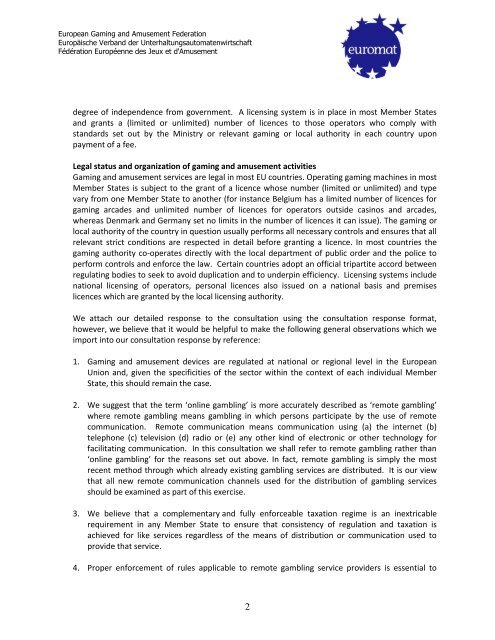Proposed structure of the EUROMAT response to the ... - Jogo Remoto
Proposed structure of the EUROMAT response to the ... - Jogo Remoto
Proposed structure of the EUROMAT response to the ... - Jogo Remoto
You also want an ePaper? Increase the reach of your titles
YUMPU automatically turns print PDFs into web optimized ePapers that Google loves.
European Gaming and Amusement Federation<br />
Europäische Verband der Unterhaltungsau<strong>to</strong>matenwirtschaft<br />
Fédération Européenne des Jeux et d'Amusement<br />
degree <strong>of</strong> independence from government. A licensing system is in place in most Member States<br />
and grants a (limited or unlimited) number <strong>of</strong> licences <strong>to</strong> those opera<strong>to</strong>rs who comply with<br />
standards set out by <strong>the</strong> Ministry or relevant gaming or local authority in each country upon<br />
payment <strong>of</strong> a fee.<br />
Legal status and organization <strong>of</strong> gaming and amusement activities<br />
Gaming and amusement services are legal in most EU countries. Operating gaming machines in most<br />
Member States is subject <strong>to</strong> <strong>the</strong> grant <strong>of</strong> a licence whose number (limited or unlimited) and type<br />
vary from one Member State <strong>to</strong> ano<strong>the</strong>r (for instance Belgium has a limited number <strong>of</strong> licences for<br />
gaming arcades and unlimited number <strong>of</strong> licences for opera<strong>to</strong>rs outside casinos and arcades,<br />
whereas Denmark and Germany set no limits in <strong>the</strong> number <strong>of</strong> licences it can issue). The gaming or<br />
local authority <strong>of</strong> <strong>the</strong> country in question usually performs all necessary controls and ensures that all<br />
relevant strict conditions are respected in detail before granting a licence. In most countries <strong>the</strong><br />
gaming authority co-operates directly with <strong>the</strong> local department <strong>of</strong> public order and <strong>the</strong> police <strong>to</strong><br />
perform controls and enforce <strong>the</strong> law. Certain countries adopt an <strong>of</strong>ficial tripartite accord between<br />
regulating bodies <strong>to</strong> seek <strong>to</strong> avoid duplication and <strong>to</strong> underpin efficiency. Licensing systems include<br />
national licensing <strong>of</strong> opera<strong>to</strong>rs, personal licences also issued on a national basis and premises<br />
licences which are granted by <strong>the</strong> local licensing authority.<br />
We attach our detailed <strong>response</strong> <strong>to</strong> <strong>the</strong> consultation using <strong>the</strong> consultation <strong>response</strong> format,<br />
however, we believe that it would be helpful <strong>to</strong> make <strong>the</strong> following general observations which we<br />
import in<strong>to</strong> our consultation <strong>response</strong> by reference:<br />
1. Gaming and amusement devices are regulated at national or regional level in <strong>the</strong> European<br />
Union and, given <strong>the</strong> specificities <strong>of</strong> <strong>the</strong> sec<strong>to</strong>r within <strong>the</strong> context <strong>of</strong> each individual Member<br />
State, this should remain <strong>the</strong> case.<br />
2. We suggest that <strong>the</strong> term ‘online gambling’ is more accurately described as ‘remote gambling’<br />
where remote gambling means gambling in which persons participate by <strong>the</strong> use <strong>of</strong> remote<br />
communication. Remote communication means communication using (a) <strong>the</strong> internet (b)<br />
telephone (c) television (d) radio or (e) any o<strong>the</strong>r kind <strong>of</strong> electronic or o<strong>the</strong>r technology for<br />
facilitating communication. In this consultation we shall refer <strong>to</strong> remote gambling ra<strong>the</strong>r than<br />
‘online gambling’ for <strong>the</strong> reasons set out above. In fact, remote gambling is simply <strong>the</strong> most<br />
recent method through which already existing gambling services are distributed. It is our view<br />
that all new remote communication channels used for <strong>the</strong> distribution <strong>of</strong> gambling services<br />
should be examined as part <strong>of</strong> this exercise.<br />
3. We believe that a complementary and fully enforceable taxation regime is an inextricable<br />
requirement in any Member State <strong>to</strong> ensure that consistency <strong>of</strong> regulation and taxation is<br />
achieved for like services regardless <strong>of</strong> <strong>the</strong> means <strong>of</strong> distribution or communication used <strong>to</strong><br />
provide that service.<br />
4. Proper enforcement <strong>of</strong> rules applicable <strong>to</strong> remote gambling service providers is essential <strong>to</strong><br />
2



